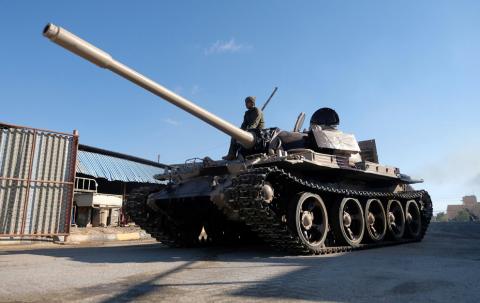Advertisement
Armed group attacks air base in southern Libya held by Haftar - officials
BENGHAZI, Libya/TRIPOLI (Reuters) - An armed group on Thursday a major air base in southern Libya held by eastern military commander Khalifa Haftar on Thursday after he moved most of his forces north to try to seize the capital Tripoli, officials said.
The eastern Libyan National Army (LNA) forces managed to repel the assault on the Tamanhint air base near Sabha, the main city in Libya's south, two eastern military officials said.
An LNA soldier was killed at the base's main gate, one official said, describing the attackers as "militia".
It was unclear whether they were linked to the internationally recognised government in Tripoli, in northwestern Libya, that is fighting Haftar-led forces allied to a parallel government based in the eastern city of Benghazi.
Haftar's LNA began its thrust on Tripoli two weeks ago, compounding the factional anarchy that has plagued the oil-producing country since late dictator Muammar Gaddadi's fall to a Western-backed uprising in 2011.
His troops have failed to penetrate Tripoli's defences in its southern outskirts, creating a stalemate on the ground, but shells crashed into a densely populated city district overnight on Wednesday, deepening the misery of civilians.
The fighting has killed at least 205 people, including 18 civilians, and wounded 913, the World Health Organization (WHO) reported on Thursday.
Haftar has concentrated his forces near Tripoli, using mainly the Jufrah air base but also Tamanhint to fly in materiel and send it on by road up north towards the Mediterranean coast.
The LNA seized Libya's sprawling south with its two main oilfield earlier this year, although tribesmen with flexible loyalties remain strong in the sparsely populated desert region.
Over the weekend the LNA dispatched units to the eastern oil ports of Ras Lanuf and Es Sider in case of any attack on them by forces aligned with the Tripoli-based government.
The resurgence of open conflict in Libya threatens to disrupt oil flows, increase migration across the Mediterranean Sea to Europe and allow Islamist militants to exploit the chaos.
International powers are aghast at the flare-up in Libya, which has scuttled a U.N. peace plan, but have been unable to present a united front to enable steps to defuse the crisis.
The Benghazi-based Haftar enjoys the backing of Egypt, the United Arab Emirates and Saudi Arabia, who view him as an anchor to restore stability and neutralise militants.
In Europe, France has given Haftar support in the past, viewing him as the best bet to end Libya's disorder.
Italy, the ex-colonial power with extensive oil holdings in Libya, backs the Tripoli government of Prime Minister Fayez al-Serraj and fumed over French reluctance to endorse a recent European Union resolution urging Haftar to halt his advance.
Serraj's government views the 75-year-old general as a dangerous would-be dictator in the Gaffafi mould.
The U.N. Security Council has been considering a British-drafted resolution that would demand a ceasefire and urge all nations with influence over the warring parties to ensure compliance.
(Reporting by Ayman al-Warfalli, Ahmed Elumami, Ulf Laessing and Stephanie Nebehay; Writing by Ulf Laessing; Editing by Mark Heinrich)



















Add new comment